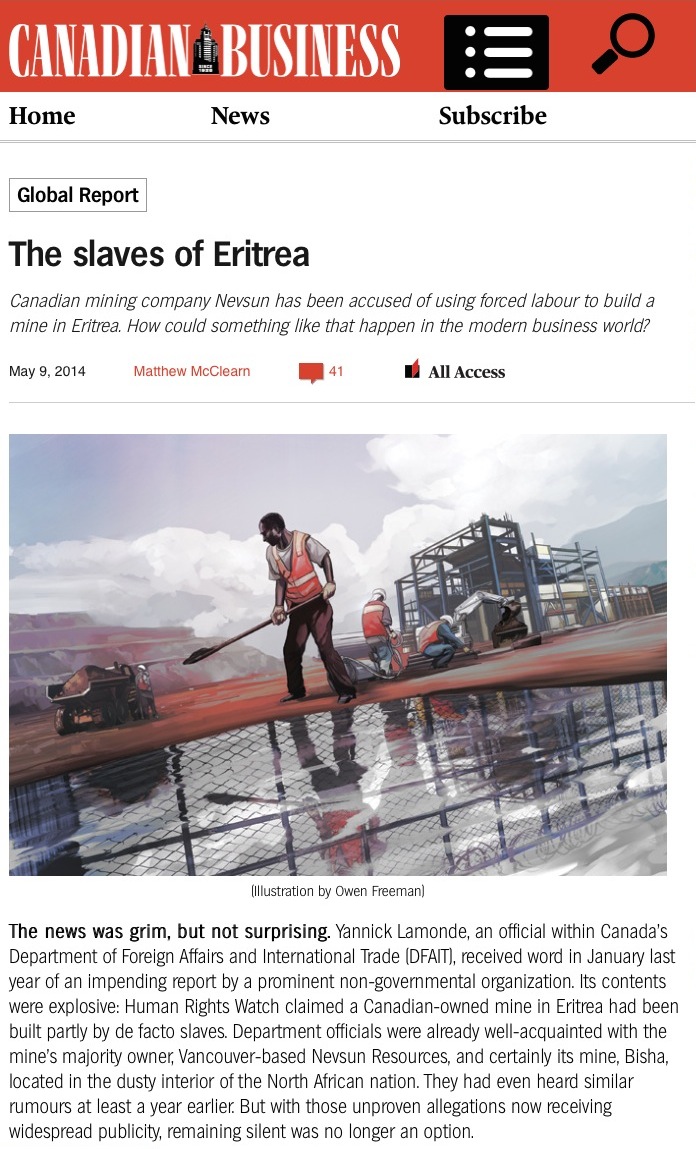Last week saw a sensational headline in Canadian Business Magazine: The slaves of Eritrea: Canadian mining company Nevsun has been accused of using forced labour to build a mine in Eritrea. How could something like that happen in the modern business world? The news wasn’t so much the allegations, now a couple of years old, that contractors at Nevsun Resources’ Bisha gold-copper mine in Eritrea had used forced labour, under inhumane conditions. It was that the Canadian government’s response to those allegations, exposed through an Access to Information request, was to worry about the company’s public reputation – not any actual abuse of workers.
But a larger issue lurks undiscussed in the background. What are the ethics of doing business in Eritrea? The accusations of using forced labour originate with Nevsun being forced to contract government and military businesses, and the company has worked to isolate itself from their labour practices. But at the same time, Nevsun’s operations are contributing to the well-being of a regime classified by many observers as one of the world’s most repressive.
The Eritrean government may well be using the revenue from the mine to build much-needed infrastructure and services, but what assurance is there that it is not also going to buy weapons? Various agencies, including Amnesty International, have found Eritrea to be one of the most repressive countries in the world, with a long list of violations including thousands of people subject to arbitrary, cruel, and indefinite detentions. Eritrea has also been subject to a UN Security Council-imposed arms embargo (UNSC Resolution 1907) since 2009, principally on account of its support for Islamist guerrilla group al Shabaab, though it doesn’t affect foreign investment. The UN found that by 2012 Eritrea had stopped direct support for the militants but continued to channel support through proxies in the region, and that sanctions should not be lifted.
Short of full economic sanctions, Canada has no legal mechanism to control investment by Canadian companies, even in cases as egregious as this. Elizabeth Chyrum of Human Rights Concern testified to the Human Rights Subcommittee of the House of Commons Standing Committee on Foreign Affairs and International Development in February, 2012, about the use of Army conscripts and the mistreatment of workers by Eritrean government construction company Segen under contract to Nevsun.
Nevsun was clearly aware of the possibility of abuse; it has been producing glossy Corporate Social Responsibility reports since 2011 supposedly addressing the potential for such violations. Despite this, CEO Cliff Davis told iPolitics in November, 2012: “I’m certainly not directly aware (of human rights violations) at all.” Davis was in Ottawa to testify before the same parliamentary committee; it is still a mystery why he appeared before the committee when he had little of substance to present, and who on the committee invited him six months after Chyrum’s disturbing testimony.
An investigation by Human Rights Watch, published soon afterwards in January 2013, supported these allegations, finding that Nevsun “initially failed to take those risks seriously, and then struggled to address allegations of abuse connected to its operations. Although the company has subsequently improved its policies, it still seems unable to investigate allegations of forced labor concerning a state-owned contractor it uses.”
In this context, the revelations by Canadian Business are especially damning of the Canadian government. Their only response to the Canadian public? That Corporate Canada “leads the world in responsible mining practices.” Nevsun’s defence is that (a) it is doing nothing illegal, and (b) it is providing benefits to Eritreans by providing jobs and revenue.
Neither the company, nor, it seems, the Canadian government has any ethical qualms about supporting the Eritrean regime, even in the absence of any guarantees that such support isn’t going directly or indirectly to support a group Canada lists as a terrorist entity — or being used to repress the country's own people.
